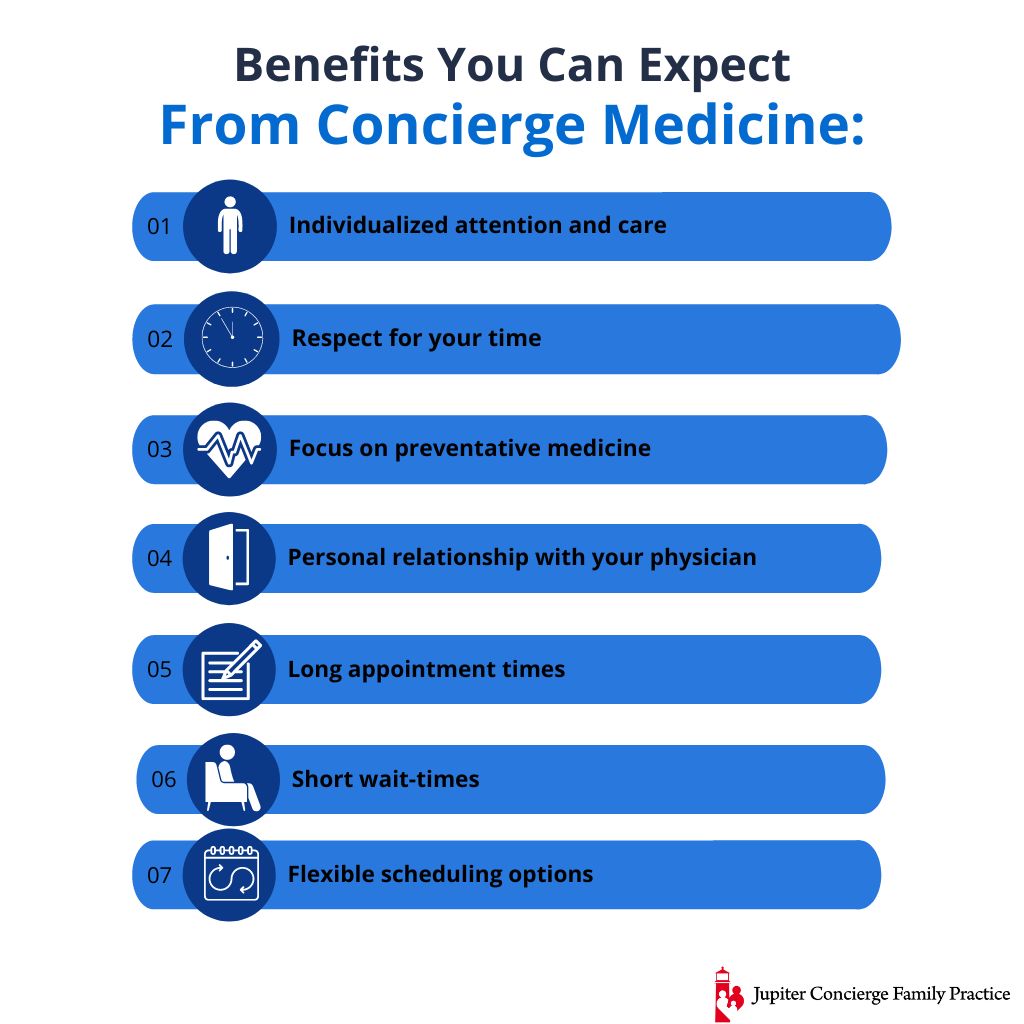
Since you found this post, you may be searching online for a “concierge doctor near me.” If that’s the case, you might already know a good deal about concierge medicine.
You may be disenchanted with the conventional medical model, tired of the pitfalls that arise with harried and hurried appointments. Or maybe you’ve just heard the term “concierge medicine” and are curious to learn more about it. After all, it’s not as widespread as the typical Primary Care Physician (PCP) model.
Regardless of what’s motivating you to ponder making the switch from a typical medical practice to a concierge medical practice, here is my top advice for finding the right fit. Answering these three questions will help you find what you need in a concierge doctor near you.
1. What Is Concierge Medicine and What Are Its Benefits?
Concierge medicine means a membership-based medical practice that allows greater physician-patient interaction. At Jupiter Concierge Family Practice, we say that we have “a modern approach to old-fashioned medicine” because we practice evidence-based and experience-based medicine while returning to a model that respects the patient-physician relationship, and the time of both.
Each year, patients pay a membership fee that allows a more personal relationship with me, their doctor. As a result, I’m able to provide more individualized service to them, and I can see each patient for as long as is medically appropriate.
The education and certification of concierge physicians is no different from that of any other medical doctor. The difference in these practices isn’t in the medical training; it’s in the way the practices operate. It’s simply seeing fewer patients to allow for a more personal level of care.
How Concierge Medicine Makes a Difference
To give you an idea of what this means in practical terms, consider that a physician at a conventional practice typically has a patient load of about 2,500 people. That physician likely sees between 25 and 40 patients per day.
On the other hand, concierge practices cap their patient memberships to ensure time and resources for quality care. At Jupiter Concierge Family Practice, for example, I have a firm cap of 350 patients. On a daily basis, I treat between 5 and 10 people.
You can imagine the benefits of such a ratio. If you come to see me for an appointment, I’m not rushing off to the next person in line. Wait times are typically non-existent because appointment times are longer by design. I’m able to offer you greater scheduling flexibility because I’m not counting on no-shows to loosen up my impossible schedule.
We can shift from a reactive, rapid-fire approach to your care into a proactive focus on preventative medicine. We can communicate outside of office hours — developing an actual relationship.
That last point is an important one, because the better I know you, the better I can care for you.

2. What’s Important To Look for in a Concierge Doctor Near You?
There are three main categories I suggest you consider in your search for the right concierge doctor near you: qualifications, values, and logistics.
You can try researching online, calling to ask questions, and seeing if a practice offers a meet-and-greet to get a sense of each category.
Qualifications
A concierge medical practice should consist of board-certified physicians as a baseline. That’s good information to verify, but I also recommend digging a little deeper. Consider finding out where the physician trained and how experienced they are in concierge medicine specifically.
All physicians are required to maintain a certain amount of continuing education in order to be licensed; learning what types of continuing education a physician has pursued will give you hints into their style of practice. Prospective patients can learn a good deal about their physician by knowing areas of specialty or interest.
Values
There must be a shared, comfortable chemistry between physician and patient. You, the patient, should feel a sense of compassion from your doctor, and you should have confidence both in the physician’s decency and in his or her medical competency.
Make sure their values match yours in terms of how they provide care. If they don’t, the relationship won’t work.
Logistics
Let’s say the qualifications look good, and the values feel right. Now it’s time to look at some of the particulars that make a huge difference when it comes to how service is delivered:
Hospital privileges — A physician with hospital privileges can admit and see patients in their local hospital.
For example, I have hospital privileges at Jupiter Medical Center, which means I can continue to offer high-level, consistent care to patients if they’re admitted to the hospital. If they end up in the emergency room, I receive an immediate notification and can be in touch with the hospital care team right away.
If having a physician with hospital privileges is important to you, make sure you ask.
Office staff — Check out a practice’s website or call to find out what their office staff is like. Is your physician supported by adequate staff? How many roles are filled? Does the office have a nurse practitioner who can help with patient education and focus on prevention? Knowing that structure will give you an idea of efficiency and capability.
Physician availability — Life brings the unexpected. Can you get same-day appointments with the physician? How does after-hours care work? Is the physician available on-demand? How about on the weekend?
Concierge medical practices offer a high level of care, and these options should be available to you. For example, my patients can reach me 24/7. They have my work number, my cell number, and my home number. These communication advantages are something to look for in a concierge medical practice.
Environment — Make sure you like the office environment. Is it clean? Aesthetically pleasing? Is it a place where you feel safe?
Is it stressful or comforting? Inviting or indifferent?
Noticing how you feel about the office — either from website photos or an in-person visit — will help you determine if it’s where you’d like to receive care.
3. Where Is the Practice Located?
If you’re searching for a “concierge doctor near me,” then you probably consider the proximity of your physician at least somewhat important.
Location, while perhaps not the most important factor, is something to consider. You want your choice of practice to make your life easier, not more difficult.
Make sure the practice is easy to find, and you can easily get in and out. Being closer to your doctor makes everything more convenient. You can see them sooner when the need arises, and you can see them when you need to without added hassle.
Whatever your reason for looking for a concierge doctor, I hope you find the right practice for you. If you take the qualifications, values, and logistics of a practice into account, I believe you’ll make a well-informed choice that will benefit you for years to come.
Jupiter Concierge Family Practice is located in Jupiter, Florida, at 2141 Alternate A1A South. We’re 5–10 minutes north of Palm Beach Gardens, between Admiral’s Cove and Jonathan’s Landing — just east of Abacoa, 15 minutes south of Home Sound, 20 minutes north of Singer Island, and accessible to Jupiter Farms.

Dr. David Rosenberg
Dr. Rosenberg is a board-certified Family Physician. He received his medical degree from the University of Miami in 1988 and completed his residency in Family Medicine at The Washington Hospital in Washington, Pennsylvania in 1991. After practicing Emergency Medicine at Palm Beach Gardens Medical Center for two years, he started private practice in Jupiter, in 1993. He is an avid baseball fan and Beatles fanatic, since he was 8 years old. He has been married to his wife, Mary, since 1985 and has three grown children.
David completed additional studies at Mercer University, Macon, Georgia and obtained a BS in Chemistry in 1983.
“My interests include tennis, snow skiing, Pilates and self-development.”
